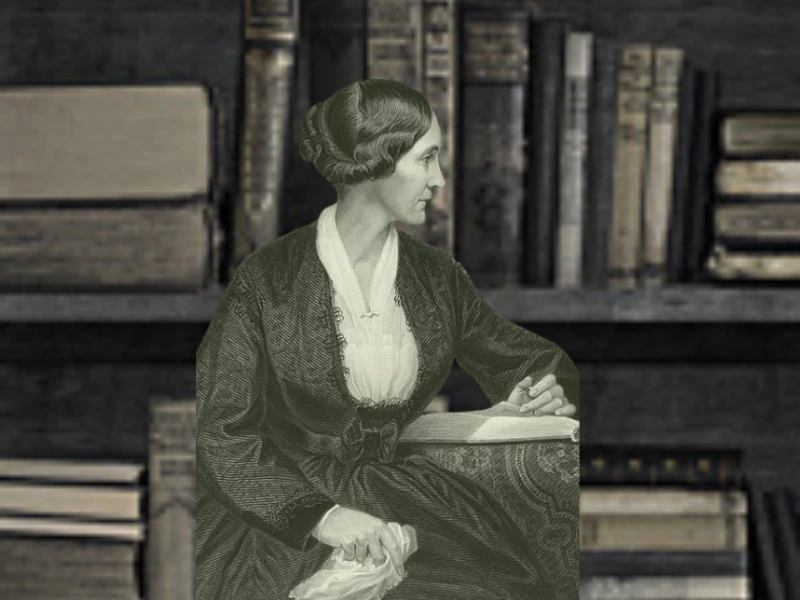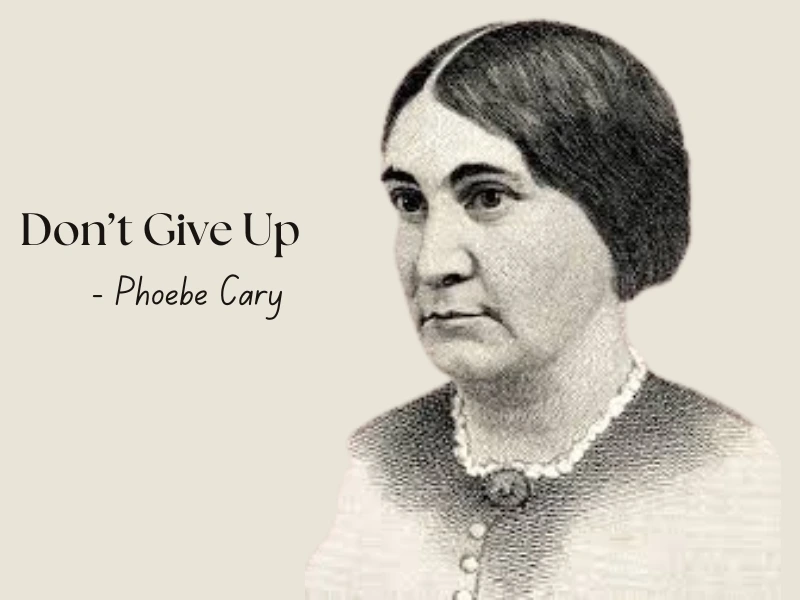Introduction to Phoebe Cary
Best remembered for her contribution to literature during the 19th century, Phoebe Cary was an American poetess who lived during a time when women’s voices often went unheard. She stood out for her talent, resilience, and passion for writing. She had a sister older than her by two years: Alice Cary, to whom she owed the recognition she earned for her poems, which are full of the themes of faith, morality, and humanity.
Phoebe Cary’s life is a story not only of literary accomplishment but also of the strength and determination that defined her during a time when society had imposed much upon women. The blog takes the reader through her life, her accomplishments, and what endures for us today.
Key Statistics About Phoebe Cary
Personal Information
- Full Name: Phoebe Cary
- Date of Birth: September 4, 1824
- Place of Birth: Mount Healthy, Ohio, USA
- Date of Death: July 31, 1871
- Age at Death: 46 years
- Siblings: Alice Cary (elder sister and fellow poet)
Career Highlights
- First Published Work: Poems of Alice and Phoebe Cary (1849)
- Most Famous Poem: One Sweetly Solemn Thought
- Major Themes: Spirituality, faith, morality, humor, and family bonds
- Notable Collections:
- Poems of Alice and Phoebe Cary
- Poems of Faith, Hope, and Love (1868)
Early Life and Family Background
Humble Beginnings
Born on September 4, 1824, in Mount Healthy, Ohio, this was a small rural community near Cincinnati. She was the youngest daughter of Robert Cary and Elizabeth Jessup Cary. Her family lived on a farm, and, although they were poor, the literary importance placed upon education was immense in the Cary household.
Sibling Bond with Alice Cary
Phoebe shared a special bond with her elder sister, Alice Cary, who also became a well-known poetess. Together, the sisters encouraged each other to explore their creative talents. They often wrote poems and shared them within their family circle, gradually refining their craft.
Education and Early Literary Aspirations
Self-Education and Literary Influences
Phoebe Cary and her sister received limited formal education, but they were voracious readers. Their father’s modest library and exposure to religious texts provided the foundation for their early literary endeavors. Phoebe was particularly influenced by the works of William Shakespeare, John Milton, and Lord Byron, which shaped her poetic style.
First Publications
Phoebe began writing poems at a young age, and by the time she was in her late teens, her works were being published in local newspapers. These early contributions earned her encouragement and recognition within literary circles.
Phoebe Cary’s Literary Career
Collaborative Success with Alice Cary
By 1849, Phoebe and Alice were published with their first collection of poems called “Poems of Alice and Phoebe Cary.” These were highly critically acclaimed and firmly established the two sisters as influential voices in American poetry. Where Alice’s was generally more serious, with an emphasis on somberness, Phoebe’s was brighter, often very funny, with a strong message regarding good moral character.
Independent Contributions
Phoebe Cary’s most notable independent work came in the form of hymns and moralistic poetry. Her famous hymn, “One Sweetly Solemn Thought,” became a timeless piece, widely sung in churches and religious gatherings. It showcased her ability to blend spirituality with poetic elegance.
Major Publications
- Poems of Faith, Hope, and Love (1868): A collection that reflects Phoebe’s religious beliefs and her deep introspection on life and death.
- Contributions to leading literary magazines such as Atlantic Monthly, Harper’s Weekly, and The Independent.
Notable Poems by Phoebe Cary
Phoebe Cary’s poetry is celebrated for its emotional depth, moral themes, and spiritual essence. Below are some of her most memorable works:
1. One Sweetly Solemn Thought
This is Phoebe Cary’s most famous poem, later adapted into a hymn. It reflects on life, death, and the hope of an eternal afterlife.
Excerpt:
One sweetly solemn thought
Comes to me o’er and o’er:
I am nearer home today
Than I ever have been before.
2. Nearer Home
A heartfelt reflection on the inevitability of death and the comfort of being closer to eternal rest. This poem, often considered synonymous with “One Sweetly Solemn Thought,” is one of her most widely quoted works.
Excerpt:
Each step I take, my seal is set
Upon the time that may not last;
Nearer my grave by every act,
Nearer the future and the past.
3. The Sabbath Bells
This poem celebrates the peace and joy of the Sabbath, evoking imagery of church bells and their calming resonance.
Excerpt:
Hark! the Sabbath bells are ringing,
And the echoes soft and clear,
To the heart a welcome bringing,
Seem to say, “The Lord is near.”
4. A Dream of Home
Phoebe Cary captures the yearning for home and the comfort it provides, both physically and spiritually.
Excerpt:
I dream of home; the spirit flies
To scenes of bygone years;
To pleasant paths, where flowery ways
Are moistened still with tears.
5. The Singer’s Lesson
This poem tells the story of a singer whose voice carries lessons of humility and faith, inspiring readers to find joy in selflessness.
Excerpt:
The song that touched the heart of men
Rose not from the halls of pride,
But where the lowliest walked unseen,
Where faith and hope abide.
6. Pictures of Memory
A nostalgic piece reflecting on memories of loved ones, blending joy and sorrow in its verses.
Excerpt:
Among the beautiful pictures
That hang on Memory’s wall,
Is one of a dim old forest,
That seemeth the best of all.
7. The Widow’s Song
This poem captures the struggles and faith of a grieving widow, touching upon themes of loss, resilience, and hope.
Excerpt:
My path may be shadowed by trials and fears,
And steeped in the bitterness often of tears;
Yet I know it will brighten, and lead to the day
When sorrow and sighing shall vanish away.
8. The Lesson of the Watermill
Phoebe Cary uses the metaphor of a watermill to impart lessons about life, time, and the importance of living meaningfully.
Excerpt:
Work while the daylight shines,
Man’s work is to labor and pray;
Then comes the rest at the evening tide,
For the waters will ebb away.
9. The Broken Household
A poignant poem dealing with loss and the emptiness that follows the departure of loved ones.
Excerpt:
The voices all are still,
The footsteps cease to fall;
And the gathering shadows shroud the hearth,
The hearts that once beat all.
10. Our Father’s Care
This poem focuses on God’s providence and love, offering solace to readers through its spiritual message.
Excerpt:
Oh! for the faith that holds us near
To our Father’s sheltering arm,
That lifts us up from doubt and fear,
And shields us from all harm.

Also read Shirley Toulson Biography
Themes and Style in Phoebe Cary’s Poetry
Spirituality and Faith
Phoebe Cary’s poems expressed her strong views as a Christian. The characteristics of her poems could be summed up by the following phrase: “rich in redemptive and sublime hope and heavenly soul.”
Moral and Philosophical Reflections
Her poems frequently offered reflections on life’s purpose, human struggles, and morality. This contemplative tone gave her work a universal appeal.
Humor and Wit
Unlike her sister Alice, Phoebe Cary had a unique gift for humor and wit. Her lighter verses often included a playful critique of societal norms, showcasing her intellectual sharpness and charm.
Nostalgia and Family
Her rural upbringing influenced her poetry, with recurring themes of family bonds and cherished memories.
Personal Life and Challenges
Life in New York City
In 1852, Phoebe and Alice Cary left for New York City to pursue further careers in literature. The sisters soon found themselves thriving literary presences in this metropolis’s literary and social hub. Their home became a salon for famous writers, intellectuals, and activists, such as Horace Greeley, John Greenleaf Whittier, and Edgar Allan Poe.
Health Struggles
Phoebe Cary faced chronic illness and physical frailty during her life. She did not let such conditions deter her from writing; she wrote with passion and determination throughout her life.
Legacy and Death
Enduring Literary Impact
Phoebe Cary died July 31, 1871, at age 46. It was hardly more than three months after her sister, Alice, died. The grief and poor health, according to some accounts, carried Phoebe off from the world. Her poetry, especially hymns, touches hearts today. Her most famous is “One Sweetly Solemn Thought,” a very good example of her ability to touch hearts with simple and gracious works.
Recognition and Memorials
She is remembered as a pioneer in literature for women. Along with Alice, she opened doors for future generations of women writers to prove that talent and perseverance could surpass the barriers of society. Her legacy is revered by schools, libraries, and literary societies named after the Cary sisters.
Key Achievements and Facts
- Famous Hymn: “One Sweetly Solemn Thought”
- First Publication: Poems of Alice and Phoebe Cary (1849)
- Cultural Impact: Hosted literary gatherings in New York City that included notable writers and activists.
- Legacy: A key figure in 19th-century American poetry, remembered for her faith-based and moralistic writings.
Conclusion: The Lasting Legacy of Phoebe Cary
The life of Phoebe Cary was a delicate balance between literary genius, spiritual depth, and personal tenacity. The 19th-century poet of a bygone era had created innumerable lines of literature to be inspiring, both to contemporary and later-day readers worldwide. Her works not only reflected contributions to the body of poetry itself but were mostly unique and very emotional in scope, making their contribution timeless by way of connection to her people at the core.
Phoebe Cary’s journey reminds us of the power of creativity and determination in overcoming adversity, ensuring her place among America’s most beloved poets.
FAQs
What is the famous work of Phoebe Cary?
Phoebe Cary’s most famous work is the hymn “One Sweetly Solemn Thought,” a deeply spiritual poem reflecting on life, death, and hope for eternal rest. It gained immense popularity and is still sung in churches worldwide.
Who wrote the poem The Legend of the Northland?
The poem The Legend of the Northland was written by Phoebe Cary. It is a ballad that tells a moral tale about selfishness and its consequences, inspired by Northern folklore.
What is Alice Cary famous for?
Alice Cary, Phoebe Cary’s elder sister, is famous for her melancholic and introspective poetry. She often wrote about rural life, family, and human struggles. Her notable works include her poetry collections and the posthumously published Ballads, Lyrics, and Hymns.
What is the poem Jacob by Phoebe Cary about?
Phoebe Cary’s poem Jacob is based on the biblical story of Jacob and Esau. It reflects themes of sibling rivalry, forgiveness, and the spiritual journey, drawing inspiration from the Old Testament narrative to convey moral lessons.




I have learn several just right stuff here. Definitely price bookmarking for revisiting. I wonder how much effort you put to make one of these magnificent informative web site.
I got what you intend, thanks for putting up.Woh I am pleased to find this website through google. “If one does not know to which port one is sailing, no wind is favorable.” by Seneca.
It’s hard to seek out knowledgeable people on this topic, however you sound like you already know what you’re talking about! Thanks
I would like to thank you for the efforts you have put in writing this website. I’m hoping the same high-grade site post from you in the upcoming as well. Actually your creative writing skills has inspired me to get my own web site now. Actually the blogging is spreading its wings fast. Your write up is a good example of it.
Good web site! I truly love how it is simple on my eyes and the data are well written. I’m wondering how I could be notified when a new post has been made. I’ve subscribed to your RSS which must do the trick! Have a great day!
A person essentially help to make seriously posts I would state. This is the first time I frequented your web page and thus far? I surprised with the research you made to create this particular publish incredible. Magnificent job!
Some truly excellent posts on this site, regards for contribution.
Hello Dear, are you in fact visiting this web page regularly, if sso aftr that you will definiteely get nice experience. https://Hallofgodsinglassi.wordpress.com/
Hey There. I found your blog using msn. This is an extremely well written article. I will make sure to bookmark it and return to read more of your useful information. Thanks for the post. I’ll definitely return.